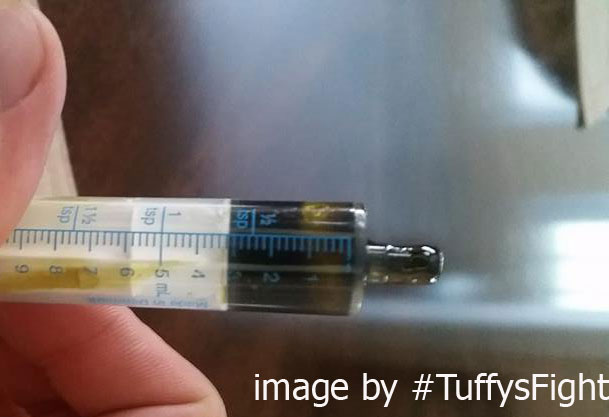Pennsylvania Allows Parents to Import Cannabis for Treatment

By Chris Goldstein
Right now parents in Pennsylvania can legally bring marijuana products in from other states to treat their seriously ill children at home. At least that is the intention of a remarkable section in the state’s new medical cannabis oil-only law.
The compassionate use legislation was signed by Governor Tom Wolf on April 17, 2016. This portion of the law became active 30 days later.
Pa. Department of Health Secretary Karen Murphy even announced this week that rules for parents to import cannabis would be ready by the end of summer.
This is the first attempt to craft explicit guidelines for individuals to move marijuana between states.
Here is the actual language tucked away in the copious text of Pa’s Act 16:
Section 2106. Medical marijuana from other states.
(a) General rule.–It is not a violation of this act or the act of April 14, 1972 (P.L.233, No.64), known as The Controlled Substance, Drug, Device, and Cosmetic Act, if a parent or guardian of a minor under 18 years of age lawfully obtains medical marijuana from another state, territory of the United States or any other country to be administered to the minor.
There have been other states who dabbled in the concept. Georgia passed a law allowing CBD cannabis oils but made no plans to grow any plants. The law assumed that parents would find what they need elsewhere but the rules were unclear.
Georgia House Representative Allen Peake, a Republican, decided to take things into his own hands. He admitted to breaking the law by importing cannabis to families in his area. Rep. Peake likened it to an act of civil disobedience.
If a parent does have an encounter with federal authorities at an airport or local police in say Oklahoma, then it will likely result in arrest. The subsequent court consequences could be rather dire. No legal remedies would be found in those situations from well-intended laws passed back in Georgia or Pennsylvania.
Parents (or sympathetic politicians) returning with a several-month supply may be carrying several ounces of cannabis oil and perhaps pre-made edibles. A backpack full of that stuff can fetch even more serious charges than a stand-alone ounce of flower.
Yet the truth is that parents frequently make this kind of trip already, despite the real possibility of prison. Some have even formed informal buyer’s clubs to reduce costs and get a longer lasting supply.
Alice (she asked that her real name not be used) has a daughter who qualifies under Pennsylvania’s medical cannabis law and she just returned from Denver.
She makes the risky transit, “About every six weeks. It’s worth it.”
Alice made her first journey to Colorado in 2015 and found that professionally made cannabis products that work best for her child, who suffers from a gastrointestinal disorder. Flights from the area cost about $280 round trip.
Is she pleased about the new protection under law?
“I don’t know. I’m scared every time I come back,” she says quietly, “I’m also very, very careful.”
Other parents make the trip with their children to Colorado and even visit doctors there. Then they find cannabis products and ship them back home. Of course, the legal consequences of getting nabbed sending anything cannabis via UPS, FedEx or USPS remain harsh.
Still, Pennsylvania is making a well-meaning attempt to create a legislative policy out of a common practice. It is an excellent idea. But things could get messy.
Most medical marijuana programs do not sell to anyone from other states – even to non-residents who are fully registered patients at home. Delaware and New Jersey operate medical marijuana programs right next door to Pa, but their regulations prohibit sales to Keystone residents. Only Nevada offers comprehensive reciprocity, but only to patients themselves and not really to caregivers.
The only real option for Pa. parents is to buy at adult use, recreational cannabis stores in Oregon, Washington, Colorado and – later this year – Alaska. This approach bends the marijuana regulations in those states.
No licensed facility in Denver or Seattle is supposed to sell to anyone who openly intends to drop cannabis products in the mail, take them on an airplane or drive them over the local borders.
It is unclear how or if regulators in other states will respond to this import/export pass for Pennsylvania parents. They could welcome the prospect or be cagey, at best.
Since this is all completely new territory we can only speculate as to how the Pa. Department of Health will deploy for this scenario. They could issue the parents special cards. Then a letter could be sent to every single police department and District Attorney asking that they honor the protection. Parents could then keep receipts to provide proof-of-source.
Then again, maybe Governor Wolf can deploy some Pennsylvania National Guard aircraft (already painted green) to take these parents on missions of mercy … or engineering students at the University of Pennsylvania can invent Star Trek-like transporter devices to accommodate the law.
There may be a far simpler solution. The existing provision could be used, just as it stands today, as a medical necessity defense in court. A safe haven.
The health department could simply issue a set of instructions to public defenders to use if parents are caught within Pennsylvania.
Because Act 16 offers a clear exemption to local prohibition laws, police and prosecutors should already honor the provision but, in reality, there will likely still be some problems. Unfortunately, it may take a test case in court to finally seal the deal on the true utility of the language.
And even after all that, adults who qualify under the law will not get any protection to buy marijuana out of state.
Pa. regulators say that it will take two years to bring the program online. Adults will have to wait.
Mike Liszewski is the Government Affairs Director at the non-profit Americans For Safe Access, a lobbying group for medical cannabis patients’ rights. He said that limiting the scope of the safe haven is needlessly discriminatory.
“A patient’s age should not determine their legal rights to possess and use medical cannabis,” said Liszewski, “But the provision is certainly better than excluding all patients. On balance, this is a good thing for patients.”
Yet the twenty-four month wait could be an eternity for those living with cancer, HIV or a terminal illness.
“The provision excludes many who need immediate relief for life-threatening conditions,” noted Liszewski.
This issue in Pa. perfectly highlights the staggering inefficiency in the patchwork of state-by-state cannabis laws. Marijuana itself is virtually impossible to legally transport over state lines while patients suffer at the whim of vastly different regulators and industry operators.
Pennsylvania’s foray into this particular issue will be interesting to follow. It may inspire similar approaches for states hesitant on local cultivation to, essentially, out-source their medical cannabis supply.
If you enjoyed this Freedom Leaf article, subscribe to the magazine today!

